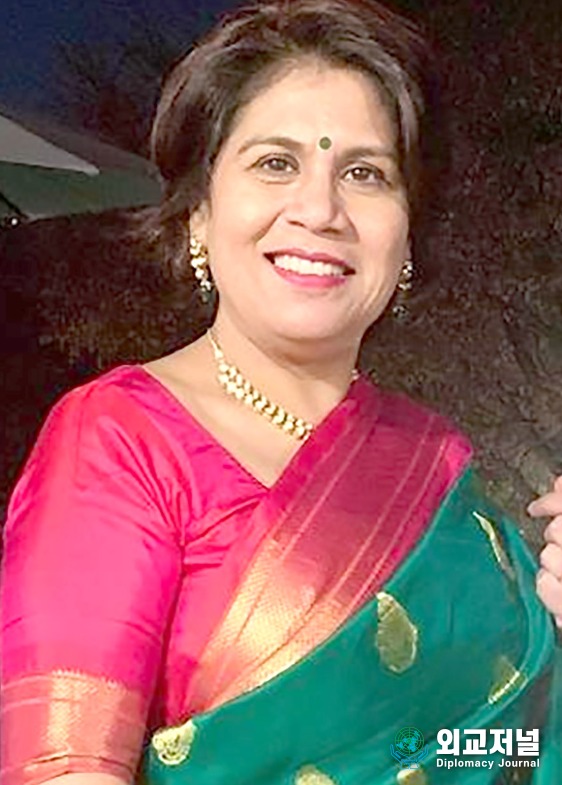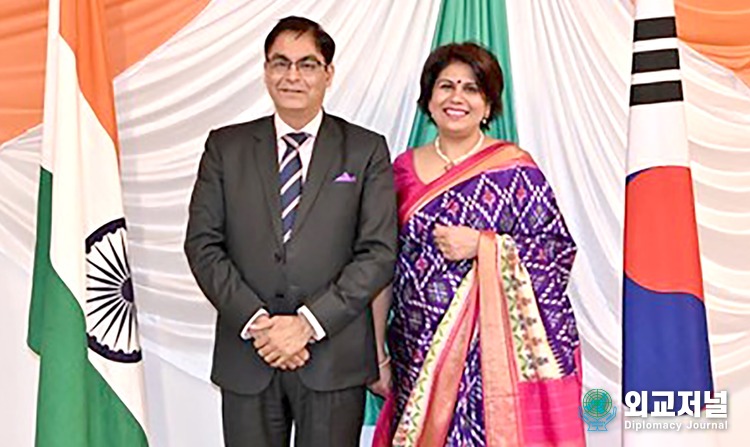“Ithink that the role of the spouse and family of a diplomat is quite unique. While the professional diplomats represent their country, the spouse and the family also play an important role,” said Surabhi Kumar, spouse of Ambassador Amit Kumar of India in Seoul.
In an interview, Madam Kumar said, “As the spouse of a career diplomat, I play a significant role in representing my country and in providing a window into sociocultural aspects of India.
She continued to say, “We come from a country which is incredibly diverse in terms of very rich history, vibrant cultural traditions, linguistic heritage and religions.

“As a spouse of ambassador, I believe it is important for me to also raise awareness about different facets of India among the Korean people, and promote mutual understanding and friendship,” she said.
The fol lowings a r e excerpts from an interview with Surabhi Kumar, spouse of Ambassador Amit Kumar of India in Seoul.
Ques t ion: Pleas e Introduce yourself. Women played a great role throughout the history of Korea, including Madam Shin Saimdang. Please introduce yourself and your family.
Answer: I am an educator and the spouse of a career diplomat. Over the past two decades, I have worked in several international schools in Berlin, New York, Tokyo, Delhi, Washington and Chicago. I specialize in teaching English and Mathematics to young children. This opportunity to have a positive impact on and to mould young minds has brought great satisfaction and joy. I have an Undergraduate Degree in Commerce and Post-graduate Diploma in Finance.
I am an avid reader, am fond of traveling, and sampling local cultures & cuisines. My spouse Amit Kumar is the Ambassador of India to the Republic of Korea. We have two teenage children, one of them in college.
Through my travels, I have juggled to wear several hats. Whether it is that of a mother who ensured that the children settled into their new environments, to a wife who walked not one step behind but rather with her partner, to a homemaker who opened her heart and home to the world and gave them a glimpse into modern India and that of an educator, who is passionate to have a positive impact on young minds.
The issue of women empowerment and gender equality is very close to my heart. I believe that each role is important in a family, whether you choose to go out to work or be a stay-at-home parent each comes with its own set of challenges. No role has a gender- it is we who have categorized jobs as being linked to male or female.
You have talked about Madam Shin Saimdang, and I feel that both South Korea and India are cultures that are replete with examples of strong women- women who have been pioneers of their times and who have continued to inspire generations of women. One such example we have is that of Rani Laxmibai who was thrust into the task of ruling a kingdom when her husband died. She took on the role with utmost sincerity and maturity. She led her people from the front, refusing to surrender to the British forces. Even today in India, young girls learn about courage in the face of adversity through her stories.

Q: Who is the First Lady of your esteemed country and the First Family. This is very important for the First Lady of Korea and the First Family.
A: Interestingly, the current President of India is Droupadi Murmu, a 64-year-old woman leader from Odisha, so we don’t have a First Lady at the moment. She is the second woman President of India. Her journey both in government and politics has been quite inspirational. Born on June 20, 1958, in Odisha's Mayurbhanj in the Santhal community, she had to struggle with poverty in her childhood in one of the most remote and underdeveloped dis-tricts of the country. She has a bachelor's degree in Arts from Ramadevi Women's College in Bhubaneswar.
In India, the First Lady or in one case, the First Gentleman, has largely had a ceremonial role. The first spouse has no official duties, but he or she generally attends the official ceremonies and functions held at the Rashtrapati Bhavan along with the president. Our former First Ladies have accompanied their husband on state visits and have been the public face of "Indian Women" during their presidency and have in a way promoted cultural diplomacy.
Responsible for implementing social welfare programs that originate from the president's office, they have also worked on and supported several social causes and rights for women and children in India during their time as the First Lady. One of our former First Ladies was a member of the Parliament herself. Another former First Lady Mrs. Vimla Sharma also simultaneously served as the Minister of State of the Ministry of Consumer Affairs, Food and Public Distribution and Minister of State for the Ministry of Women and Child Development in early 1990s.
The role of a First Lady is without a rule book really. The role is continuously defined and redefined by the unique personalities, capabilities, and active engagement of the women who serve in the office. Historically, the role of a first lady has been associated with that of a hostess. In this capacity, first ladies are expected to fulfill ceremonial responsibilities such as coordinating social gatherings, greeting guests, and attending events with their husbands.
Q: Who are the most prominent ladies in your country other than the First Lady, such as the women leaders in the political world, business circles, social and other areas? Please introduce them in detail.
A: We are noticing that worldwide, cultu res are steadily moving towards gender equality, stereotypes are being challenged and diverse representation of women is becoming more visible across fields. However, this remains a work in progress. Advocacy, inclusive mindsets and tangible action are needed from all. Indian women are increasingly playing a more prominent role in all walks of life, be it, political, economic, media, cultural or sports. Over the years, we have already had a woman President, Prime Minister, Speaker of Parliament, several Cabinet Ministers, Chief Ministers of provinces, etc. If you look at the business and economics area, you will find women heading major healthcare groups, financial groups, consultancies, large businesses, some considered traditionally male dominated such as steel, oil and natural gas, as well as new age companies such as digital companies, biotechnology, startups etc.


